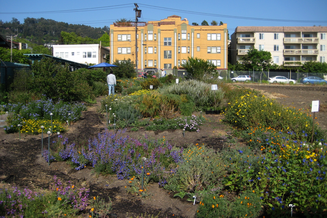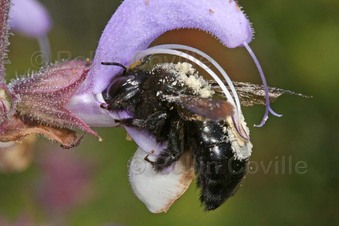Why Make a Bee Garden?

The Oxford Tract Garden, spring 2008.
Do you enjoy having a garden with diverse plants that produce beautiful flowers and perhaps some fruits and vegetables? Do you enjoy seeing bees, butterflies and hummingbirds visiting your flowers for nectar rewards? Do you have the feeling that your diverse garden is in some small way contributing food resources and shelter that these animals and other small garden creatures require? Have you ever wondered about doing more to encourage these benign animals?
Bees (and a few other insect groups) provide a useful service to urban plants. In return for the little floral pollen and nectar resources taken and perhaps some small space for nesting, bees pollinate many of the flowers of our ornamental, fruit, and vegetable plants. In some cases this service is obligatory, that is bees are absolutely necessary to cross pollinate plants to receive mature fruits and viable seeds. Thus, they are very beneficial to urbanites. This important service goes on largely unnoticed and uninterrupted during the flowering season.
Bees (and a few other insect groups) provide a useful service to urban plants. In return for the little floral pollen and nectar resources taken and perhaps some small space for nesting, bees pollinate many of the flowers of our ornamental, fruit, and vegetable plants. In some cases this service is obligatory, that is bees are absolutely necessary to cross pollinate plants to receive mature fruits and viable seeds. Thus, they are very beneficial to urbanites. This important service goes on largely unnoticed and uninterrupted during the flowering season.

A female carpenter bee pollinating Salvia.
Some of our pollinator workshop participants and neighborhood collaborators have recognized that their gardens are contributing a wide variety of resources that aid in the reproduction and survival of many small-animal visitors. They also recognize that by designing their gardens in certain ways they are providing a measure of protection and conservation for these largely beneficial organisms.
In light of the above considerations, this website was created to make urbanites aware of an often overlooked group of important insects…the BEES, and especially the native bees. We also offer information on how urbanites can make simple adjustments and additions to their gardens that will provide flower food and even nest sites to aid in the survival and reproduction of this group of insect pollinators. This information may take on added importance for some when they realize that in a broader context we are currently experiencing a global decline in pollinators, especially bees. The question of "what can I do to help" has come up many times in our workshops. We offer many suggestions to those wishing to aid bees at a very local level, the home or community garden. (See Eric Grissell's excellent book, Insects and Gardens: In Pursuit of a Garden Ecology on Amazon.com)
In light of the above considerations, this website was created to make urbanites aware of an often overlooked group of important insects…the BEES, and especially the native bees. We also offer information on how urbanites can make simple adjustments and additions to their gardens that will provide flower food and even nest sites to aid in the survival and reproduction of this group of insect pollinators. This information may take on added importance for some when they realize that in a broader context we are currently experiencing a global decline in pollinators, especially bees. The question of "what can I do to help" has come up many times in our workshops. We offer many suggestions to those wishing to aid bees at a very local level, the home or community garden. (See Eric Grissell's excellent book, Insects and Gardens: In Pursuit of a Garden Ecology on Amazon.com)
